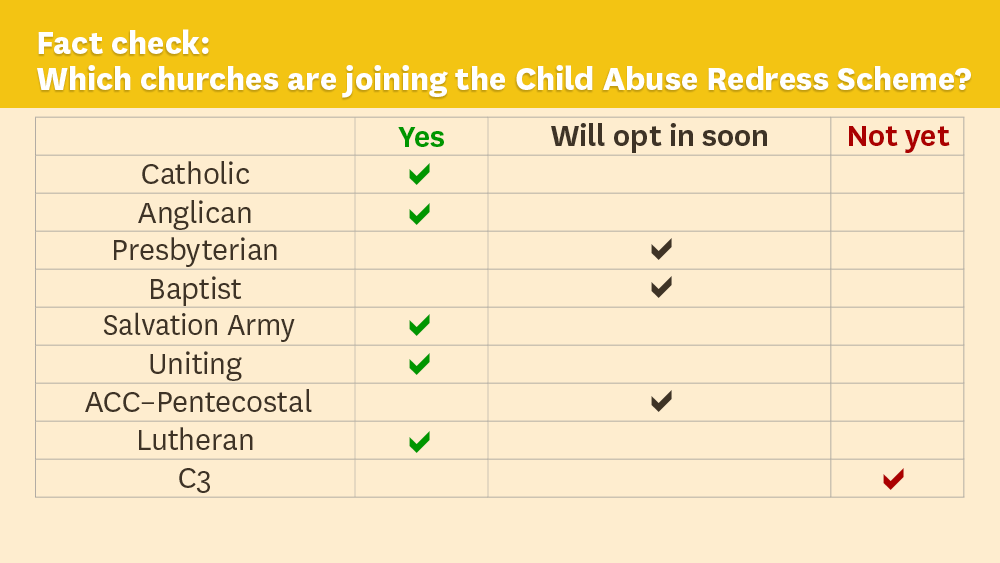Who’s signed up for the Redress Scheme
And who is still thinking about compensation for sexual abuse survivors
The start date for the federal government’s Redress Scheme to compensate survivors of child sexual abuse is July 1. It is becoming clear that not every Christian church will make that deadline. This is based on public statements and an Eternity survey of groups of churches that have not made public comments.
The redress scheme, recommended by the Royal Commission into Institutional Responses to Child Sexual Abuse, will provide counselling support, an avenue for direct apologies and monetary compensation to survivors.
With the recent “opt-in” by the West Australian government, every state and territory and the federal government are on board. Some churches have told Eternity they have been waiting for each state to join up.
“We are pleased that six major non-government institutions have committed to join the scheme,” reads an official statement by thefederal redress team. “The Catholic Church, the Anglican Church, the Salvation Army, YMCA, Scouts Australia and the Uniting Church have all announced that they will join the Scheme and provide redress to people sexually abused as children in their care.”
“We acknowledge the impact of child sexual abuse in the lives of those who have been abused.” – Stuart McMillan
For example, the Uniting Church’s president, Stuart McMillan, announced the church’s opt-in decision on June 4. “We acknowledge the impact of child sexual abuse in the lives of those who have been abused in our institutions or those of our predecessor Churches. It is our sincere hope that this National Redress Scheme will allow survivors of institutional child sexual abuse to access support to help them in their lives.”
But behind that and similar announcements by the Anglicans and Catholics is the wrangling of complicated church structures. For example, the Anglicans have formed a special company to “provide a single point of engagement with the scheme and enable Anglican entities to join as part of a national group”.
The Anglican dioceses are joining up – for example, the Sydney and Melbourne dioceses (regions) have both made announcements. However, the situation is complicated by the fact that some church bodies in all types of churches (denominations) may meet infrequently. The Anglican Diocese of the Northern Territory may be the last part of the Anglican family to formally sign on simply because it meets every two years.
“We support the royal commission’s recommendation for a national redress scheme.” – Bishop John Henderson
The Catholic Church was the first major denomination to opt in. “We support the royal commission’s recommendation for a national redress scheme, administered by the commonwealth, and we are keen to participate in it,” Australian Catholic Bishops Council president Archbishop Mark Coleridge said in a statement.
The Lutherans opted in with a public announcement on June 16. “In joining the National Redress Scheme, the LCA is acknowledging the wrongs done to those who have experienced child sexual abuse in our church, and is making a commitment to support them,” said Bishop John Henderson.
The Presbyterian’s General Assembly meets every three years “But we are unlikely to wait that long,” John Wilson, its Moderator-General (national leader) tells Eternity. “We are currently in discussions between the equivalent departments in each state to come up with a joint agreement .”
“We are currently in discussions between the equivalent departments in each state.” – John Wilson
Just like the nation, many churches have federal structures that slow things down. Speaking for the Baptists Keith Jobberns, National Ministries Director, tells Eternity: “The National Council of the Australian Baptist Ministries (The Baptist Union of Australia) has resolved to encourage all state and territory Baptist associations and national Baptist agencies to participate in the national redress scheme for survivors of institutional child sexual abuse.
“We are very supportive of the national scheme, trusting that it will provide a supportive and equitable response to all the survivors of institutional child sexual abuse. Our hope is that the redress will help bring some measure of healing to survivors of abuse that they suffered in Baptist institutions.”
He points out that all the leaders of state and territory associations “need to process their intention to opt in through their assembly meetings scheduled later in the year.”
“Our hope is that the redress will help bring some measure of healing to survivors of abuse.” – Keith Jobberns
Baptists are a form of church that avoids a “top-down” structure and has strong emphasis on the autonomy of the local church, which explains Jobberns’ way of putting things.
Most Pentecostal churches take a similar view. The Australian Christian Churches group links largely autonomous local Pentecostal churches. “ACC is in active discussions with the Redress Taskforce,” an ACC spokesperson tells Eternity. “Our continued desire is to find a way for churches within our fellowship to be able to opt into the scheme, and be able to satisfy the financial component of any applications approved under the National Redress Scheme.” UPDATE The ACC has issued a statement confirming Eternity’s assessment that this denomination belongs in our “will opt in soon” category.
“The Australian Christian Churches (ACC) announces its intent to opt into the National Redress Scheme for survivors of institutional child sexual abuse.
“We already have a well established single legal entity that has been working with the National Redress Scheme as part of the consultation process to date, and will continue to work with the scheme with the objective of entering into a Memorandum of Understanding (MoU) to enable all our churches, schools and ministries to opt in via this entity.”
Another large Pentecostal network, C3, has not joined the redress scheme. In fairness to C3, it did not feature in evidence at the royal commission.
The cap for Redress Scheme payments will be $150,000, with an average payment of $76,000. The payments will come from the institutions responsible. the total cost has been estimated at $4 billion.
Email This Story
Why not send this to a friend?




